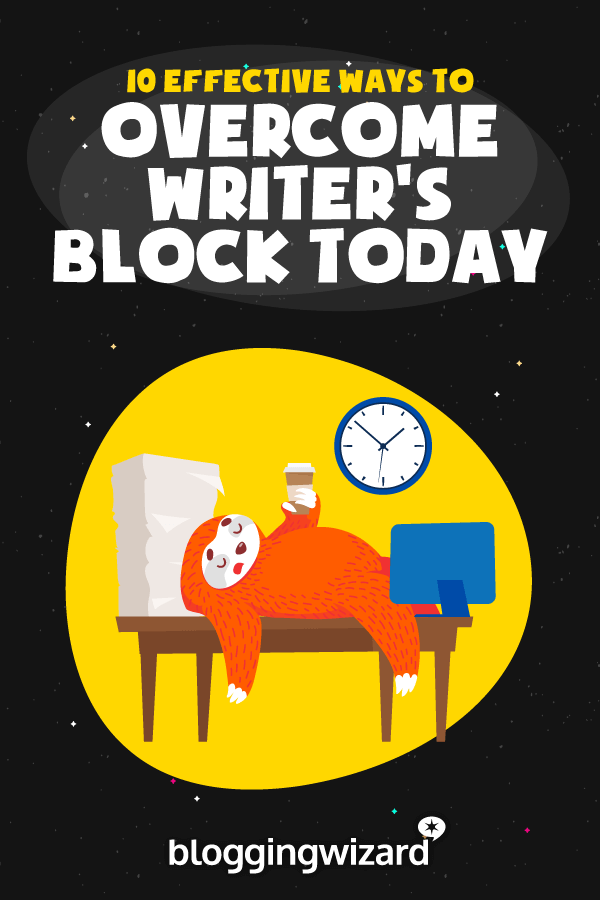How To Overcome Writer’s Block Fast

It’s a Monday morning and at the top of your to-do list is that article you’ve been putting off for the last 7 days.
You know the topic well but the words don’t seem to come out and all you can do is stare at a blank document.
I can relate. It happened to me when I sat down to write this.
It’s writer’s block and it’s your arch nemesis when you want to get stuff done.
What is writer’s block?
Writer’s block is the complete lack of ability to put your thoughts on paper in any coherent way. When I started this article, I was grinding my teeth in annoyance because I couldn’t get going.
And the more my annoyance grew, the harder it was to actually write. It’s a self-perpetuating cycle where the only way to beat it is to get out of the situation entirely.
How to overcome writer’s block
So how did I manage to get over the hurdles to writing this post? Here are some of the things I’ve tried and found to be successful.
1. Change your expectations
One of the many reasons why we get stuck as writers is because we have high expectations of ourselves. And we beat ourselves up if we can’t meet them.
Not being able to write when we tell ourselves we should, is just a glitch, it’s not the end of the world. The only thing you’re hurting by not being able to write is your image of how you should be performing.
Sit with your feelings for a little while and truly analyse them. Are you stuck because you feel your writing isn’t good enough? Are you worried that you can’t compete with other, better writers?
Feeling this way is okay, but believing those thoughts can be destructive. Change your expectations. Sure, you’re not perfect, you’re no Stephen King and you don’t have to be. But you’re good enough to do what you need to do.
2. Eliminate distractions
We live in a world full of distractions and it’s easy to get sidetracked with what’s happening on Twitter or constantly refreshing your inbox.
In a time of information overload, removing distractions is an effective way to focus in on the task at hand.
Chrome Extensions like Stay Focused and Block Site can help you restrict access to websites you waste a lot of time on.
When it comes to your phone, switch on do-not-disturb when you’re writing. Or, turn off notifications for everything other than important features like calls and text messages.
You’d be amazed by how much time you save when not looking at your phone or social media.
Note: I removed notifications for all my apps on my phone and laptop and cut my writing time in half!
3. Get social
Writer’s block often hits me when I’ve been alone for a while. Even as an introvert, I still benefit from a bit of human connection from time to time. And if I haven’t had any for a while, feelings of isolation set in and I find it hard to focus.
We’re social creatures by nature, so taking the time to socialise is a great way to recharge the batteries and let off steam. What’s more, social settings expose you to more thoughts and ideas than you’d get staring at the same four walls.
You could even take socialising a step further, by taking your writing with you. Head to a local coffee shop or library and absorb the atmosphere while you write.
Invite a friend to work alongside you so you can take regular breaks to catch up. You’ll soon find the work goes much faster with the company.
4. Play a game
When your creative energy is waning, consider playing a game. I turn to games often as a way to generate ideas and escape the reality of an empty head.
Some might consider games as a distraction technique but in my experience, they can be used to help you become inspired.
Alongside some excellent soundtracks and the improvement in graphics these days, games can teach you:
- How not to write – look at the interaction between characters. Pick out the errors and consider how you’d do it better.
- About writing a plot – choose a game with a great story to learn how the ideas come together.
- To pay attention to the details – look closely at the details of a game. Whether it’s the narrative, a plot device or a description. This can be enough to spark an idea or two.
You could also just play a game for the fun and escapism of it. Taking your mind off writing and inspiring it with something else will definitely do the trick.
5. Read something
One of the most popular pieces of advice writers receive, is that to be a good writer, you need to read, and read often.
The same can be said for writers facing writer’s block. Taking the time to immerse yourself in someone else’s writing exposes you to a new linguistic world with ideas you haven’t explored yet.
It doesn’t have to be another person’s writing either. Going back over articles you’ve written in the past, old blog posts and even stories you wrote as a kid, is a way to familiarise yourself with your own style of writing.
You may even re-discover that true style you lost with years of education and being told how to write.
6. Listen to music
Music is a sure fire way to break up the pain of writer’s block. Whether you’re listening while you brainstorm ideas or step away from the laptop to absorb some sounds, distraction-free.
I often find re-visiting playlists from my youth a helpful exercise. They tend to evoke nostalgia and draw emotions to the surface which is great fodder for writing material.
To give you an idea, listening to Placebo reminds me of summer with my friends, a great time in my life full of positive vibes and self-exploration. What does it for you?
On the other hand, listening to soothing sounds while you write is a great environment for focusing in on your writing. There are even custom made playlists on the likes of Spotify, specifically for maintaining focus.
When I’m stuck I flick on the Daydreamer playlist or tune into some abstract sound-scapes to block out my environment.
7. Take a shower
Or a bath. Either will do. The process of doing something mundane like having a wash gives your mind space to wander. And if you’re stuck with something, your brain is more likely to find a solution when it has some breathing room.
On the flip side, a good freshen up in a cool shower can rejuvenate and re-energise you. It might be just what you need after ages sat at your desk, staring at a screen.
8. Exercise
Many writers extol the virtues of being out in the open air as a way to generate ideas. Even Charles Darwin had some of his greatest breakthroughs during his daily walks.
In a study by Stanford, scientists found that walking improves creativity and sparks inspiration. Convergent thinking comes up as a particular area improved through physical exercise. That is, the ability to come up with solutions to a problem – something we all face when experiencing writer’s block.
So by hitting the gym, going for a morning run or simply having a brisk walk or two around the block, can be enough of a hit to your system to get your creative juices flowing.
9. Brainstorm
Brainstorming is mentioned all the time as a creative solution to many issues, for good reason. Emptying your head of thoughts and putting them onto paper can help you visualise ideas and connections more easily.
For writer’s block, brainstorming is an effective way to generate ideas. Try playing word association with a brainstorm. Write the main topic of your article or blog post on the page and think of as many words as you can that relate to it in some form.
Even better, open up a thesaurus to help. By the end of the exercise, not only will you be far more familiar with the topic, but will also have related words and ideas bouncing around your head, waiting to spill out onto the page.
10. Do nothing at all
Finally, sometimes you just have to stop doing and just sit with nothing but your thoughts. We spend so much of our day cramming in every little task and detail, that we never have enough time to learn to sit and observe.
Sure, it’s uncomfortable. Your fingers might be twitching to grab your phone and fill the boredom. But being able to sit with your discomfort is a valuable experience. It provides the opportunity to observe things as they are and be mindful of your thoughts as they flicker past.
Through practising this exercise, you will eventually learn that writer’s block is a fleeting situation and that too shall pass. And you’ll be comfortable enough to sit with it when it comes.
Final thoughts
Every writer fears the onset of writer’s block because it means our productivity will be disrupted. Despite how much we try to avoid it, it’s inevitable that it’ll come to visit.
But don’t worry, it doesn’t spell doom for your writing career. It’s just a blip you can overcome like anything else.
Try some of the methods I’ve suggested above to help you unstick yourself. Write in a social atmosphere, go for a walk, or engage with a round or two of your favourite games.
Eventually, it will pass and your mind will be right back on topic.

